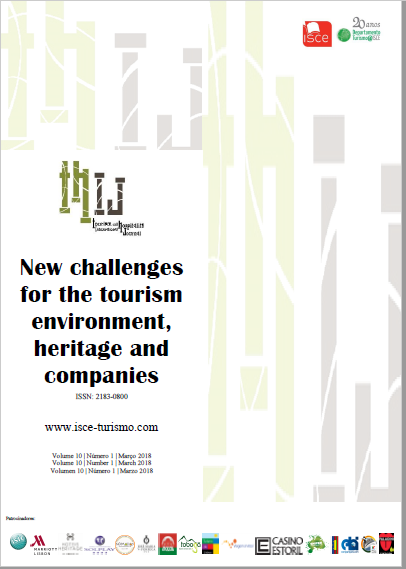The importance of tourism in the financial performance of hotel companies - proposal of a research model
DOI:
https://doi.org/10.57883/thij10(1)2018.30498Keywords:
Tourist accommodation, Hotels, Financial indicators, Macroeconomic variables, IndebtednessAbstract
This article aims to present a proposal for a research model that may contribute to reinforce the understanding of how some variables related to tourism activity may influence the financial performance of hotel companies in Portugal. The study, still under development, aims to assess the impact on the indebtedness of companies operating in this specific area of tourism activity. The tourism sector, and in particular the hotel industry, contributes significantly to the development of the Portuguese economy, since it has a decisive weight in the Portuguese balance of payments. This article aims to provide an overview of the economic impact of tourist accommodation on the economy in general and tourism in particular, in recent years in our country, presenting data and quantitative and qualitative contexts that justify the development and impact on tourism activity. At a methodological level, the financial information of 275 hotel companies made available in the SABI database (Sistema de Análisis de Balances Ibéricos) was taken into account. Subsequently, the data treatment was carried out through the SPSS (Statistical Package for the Social Sciences) software, in order to answer the research hypotheses presented herein.
References
Chen, M. (2010). The economy, tourism growth and corporate performance in the Taiwanese hotel industry. Tourism Management, 31, 665-675.
Deloitte. (2017) A arte do crescimento. Atlas da Hotelaria 2017 (12ª edição). Retirado de https://www2.deloitte.com/content/dam/Deloitte/pt/Documents/transportation-infrastructures-services/Atlas%20da%20Hotelaria%202017.pdf, acedido a 07/02/2018.
Farcnik, D., Kuscer, K., & Trobec, D. (2015). Indebtedness of the tourism sector in Mediterranean countries. Tourism Economics, 21(1), 141-157.
Holjevac, I. A. (2003). A vision of tourism and the hotel industry in the 21st century. Hospitality Management, 22, 129-134. doi: 10.1016/S0278-4319(03)00021-5.
INE (2017a). Conta Satélite do Turismo 2014-2016. Retirado de file:///C:/Users/Nuno%20Abranja/Downloads/07CST_2014-2016.pdf, acedido em 09/02/2018.
INE (2017b). Estatísticas do turismo – 2016. Retirado de file:///C:/Users/Nuno%20Abranja/Downloads/ET_2016a.pdf, acedido a 09/02/2018.
INE (2007). Classificação Portuguesa das Actividades Económicas – Rev.3. Retirado de https://www.ine.pt/ine_novidades/semin/cae/CAE_REV_3.pdf, acedido a 08/03/2018.
Lincoln, Y., & Guba, E. (2000). Paradigmatic controversies, contradictions, and emerging confluences. In N. K. Denzin & Y. S. Lincoln (Eds.), Handbook of qualitative research, (2nd Ed.). Thousand Oaks, CA: Sage.
Mucharreira, P. R. & Antunes, M. G. (2015). Os efeitos das variáveis macroeconómicas no desempenho das organizações: Evidência das pequenas e médias empresas em Portugal. Contabilidade & Gestão - Portuguese Journal of Accounting and Management – Revista Científica da Ordem dos Contabilistas Certificados, 17, 113-143.
Olorunniwo, F., Maxwell, K. Hsu & Udo G. (2006). Service quality, customer satisfaction, and behavioral intentions in the service factory. Journal of Services Marketing, 20, 59-72.
Pordata (2016). Base de dados de Portugal contemporâneo. Lisboa: Fundação Francisco Manuel dos Santos. Retirado de http://www.pordata.pt, acedido a 03/12/2016.
Sampieri, R. H., Collado, C. F. & Lucio, P. B. (2006). Metodologia de pesquisa. São Paulo: McGraw-Hill.
Tuominen, P. P., & Ascenção, M. P. (2016). The hotel of tomorrow: a service design approach. Journal of Vacation Marketing, 22(3), 279-292. doi: 10.1177/1356766716637102.
Turismo de Portugal (2018a). Análise regional | 2017. Retirado de http://travelbi.turismodeportugal.pt/pt-pt/Documents/An%C3%A1lises/Alojamento/analise-regional-2017.pdf, acedido em 07/03/2018.
Turismo de Portugal (2018b). Barómetro de conjuntura aos estabelecimentos hoteleiros | Inverno 2017/18. Retirado de http://travelbi.turismodeportugal.pt/pt-pt/Documents/An%C3%A1lises/Alojamento/barometrodeconjunturaestabelecimentoshoteleirosinverno201718.pdf, acedido em 07/03/2018.
Turismo de Portugal. (2016). Linha de apoio à qualificação da oferta 2016. Retirado de http://www.turismodeportugal.pt/Portugu%C3%AAs/turismodeportugal/newsletter/2016/Pages/LinhadeApoioaQualificacaodaOferta2016.aspx, acedido a 03/02/2016.
UNWTO (2017). Tourism highlights: 2017 edition. Retirado de https://www.e-unwto.org/doi/pdf/10.18111/9789284419029, acedido a 10/02/2018.
Yeoman, I., Hsu, C., Smith, K., & Watsons, S. (2010). Tourism and demography. Oxford, Goodfellow Publishers Limited.
Downloads
Published
How to Cite
Issue
Section
License
Copyright (c) 2018 This work is licensed under a Creative Commons - Attribution 4.0 International (CC BY 4.0)

This work is licensed under a Creative Commons Attribution 4.0 International License.
This work is published under the Creative Commons Attribution 4.0 International License.






